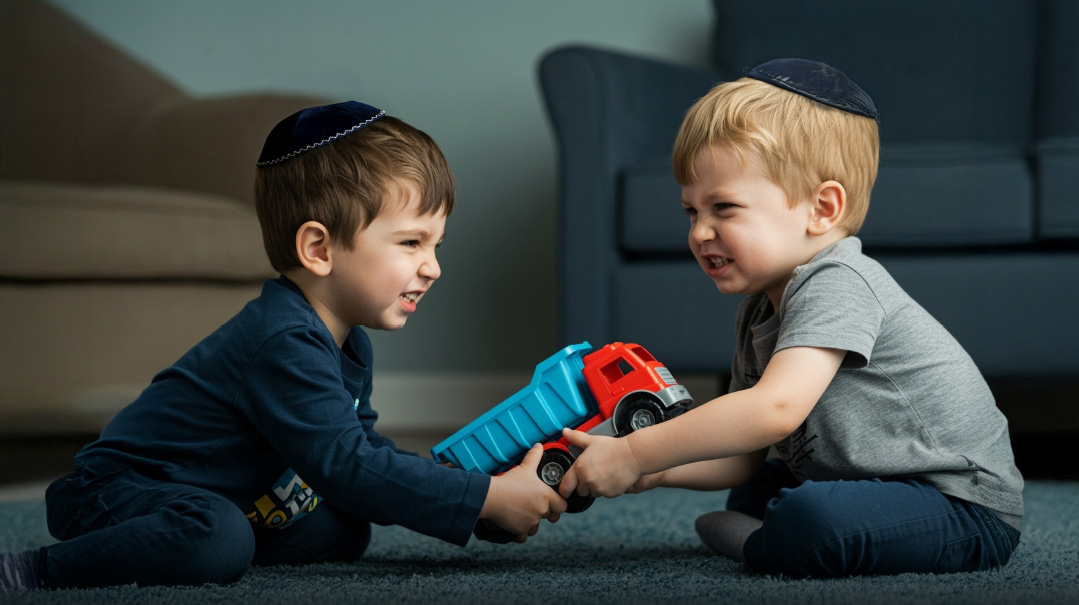Fighting for Family
| May 6, 2025Siblings can be each other’s best friend — or worst enemy. Here are our best tips for guiding them through and away from sibling rivalry

The Power of Phrasing
When it comes to fights, the line ,“I will not let you hurt” is more powerful than, “We don’t hurt.”
—T.P.
Staten Island
One Step at a Time
Whatever the fight is, it probably started long, long ago (like, at birth) so there’s usually no way to assess what really happened. I don’t try to pin down who started it, but deal with the situation at hand (what should we do now?).
—Z.K.
Israel
A Note About Age
When I decide how to respond to an argument, I consider this: The younger child is not always the victim (and might, in fact, trigger the fight because he knows he won’t get into trouble!). Kids are still kids who need love and support, whether they’re five or 15, and age doesn’t turn a child into a tzaddik who can handle everything.
—T.W.
Jerusalem
Lighter Approach
Humor helps! I once got so frustrated at the comparisons that I started a whole spiel about how everyone needs glasses, since X has glasses, or eye infection medicine, since Z just got that... all the kids were giggling at the absurdity.
—Anonymous
Two Rights, Two Wrongs
I’m guided by a phrase I learned from Rebbetzin Sima Spetner: “There are always two rights and two wrongs.” I can teach kids that no one is usually totally right or totally wrong, so I let them each have a chance to talk. I also use this idea in my practice, helping clients understand that fights are never black and white; each person does something right and something wrong. The kids don’t like it, but part of parenting is not being swayed by kids’ reactions.
—Shira Fruchter, MSW
You, Me, We
You, Me, We by Rochie Levin teaches kids how to verbalize their feelings, notice others’ feelings, and find a strategy to tackle the issue. When I see my kids fighting over something, I say, “You, me, we, kinderlach, remember?” and they run through the steps.
Y.R.
Jerusalem
Stepping Back
My boys are close in age. When they fight, I try not to get involved because I know it’s a fair match. My only rule: NO BLOOD.
F.H.
Southfield, MI
Creating Equilibrium
Everyone has equal rights to space and possessions, yet some kids have bigger personalities. One child might always claim a certain seat or decide which songs we play on Erev Shabbos. In such cases, I intervene to offer the other child a say.
K.T.
Jerusalem
One-on-One
Giving each child one-on-one time once a week makes all the difference in their development and their relationships with each other. (And some kids love it if you call it a “date with Mommy.”) It may require coordinating with your spouse or hiring a babysitter, but it’s worth it.
C.L.
Phoenix, AZ
Growth Is Good!
You don’t need to parent your younger kids the same way you parented your older kids when they were young, “just to be fair.” Over time, you grow and learn new ways to parent. Be forgiving of yourself and flexible if something isn’t working.
R.R.
Ramat Beit Shemesh
Strength and Unity
I try to highlight my children’s uniqueness among their siblings by giving them jobs they’re good at and like doing.
I also create an atmosphere of achdus by letting siblings chip in for each other’s birthday gifts (they decide if/when/how much), playing family games that are social and interactive, and schmoozing all together so they develop care and interest in each other’s day-to-day lives.
Leba Friedman
Neve Yaakov, Jerusalem
Mindel’s Tips:
When you see siblings playing nicely together, there’s an instinct to compliment the behavior, but some kids will instinctively start fighting the moment you point out that they’re not! Instead, you can reinforce it with other positive attention, like a spontaneous treat or reward (“Here’s a cookie!” or “I’m letting you guys stay up fifteen minutes later tonight, just because.”)
Avoid labeling your kids, especially in comparison (“This is my artistic son, but his brother is the sporty one,” or “My oldest was so social and this one is an introvert.”) This pits siblings against one another and inadvertently puts them into boxes that are hard for them to escape. Instead, you can say things like, “He’s really great at piano,” without the comparison, allowing space for another kid to excel (or even just be okay) in his musical abilities.
Don’t set up competitions between kids. I learned from Rebbetzin Sima Spetner that they should only compete against the clock, or you!
(Originally featured in Family First, Issue 942)
Oops! We could not locate your form.








